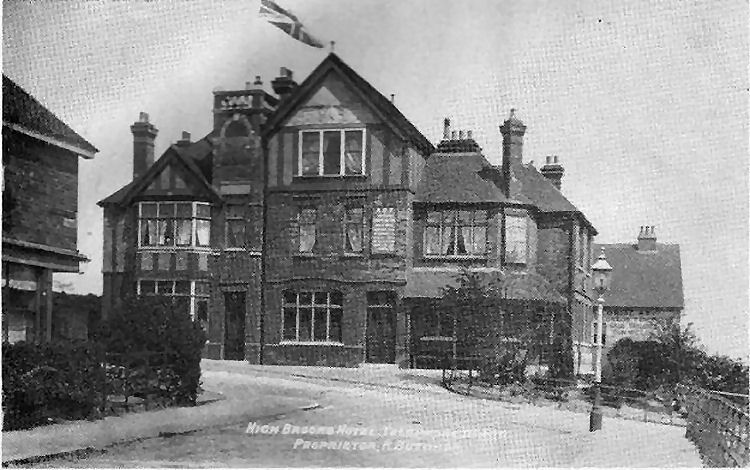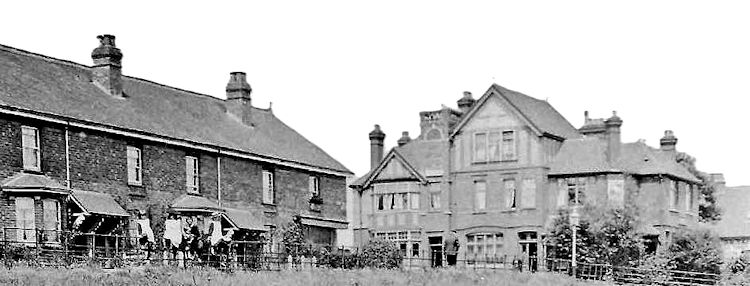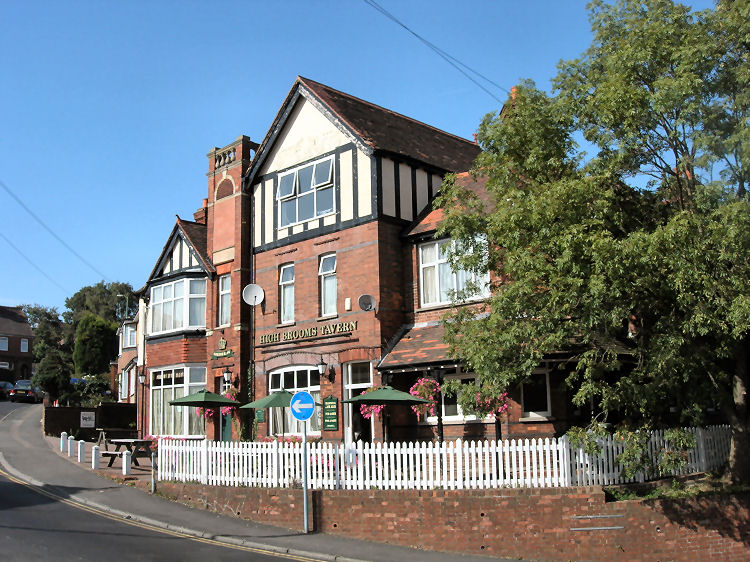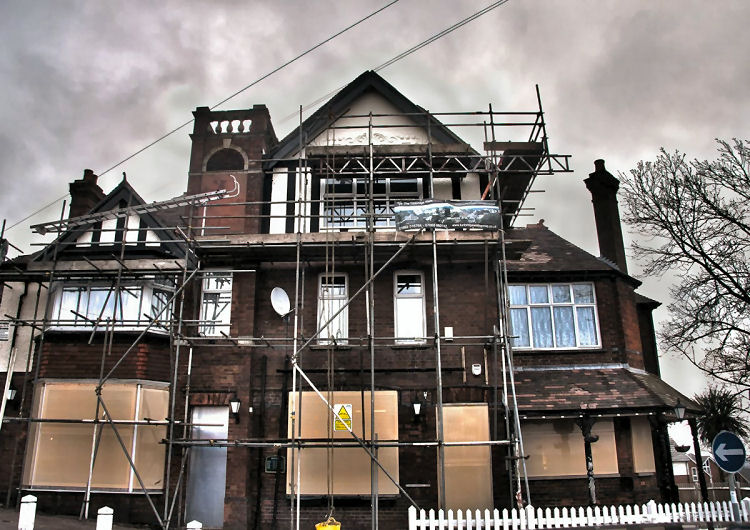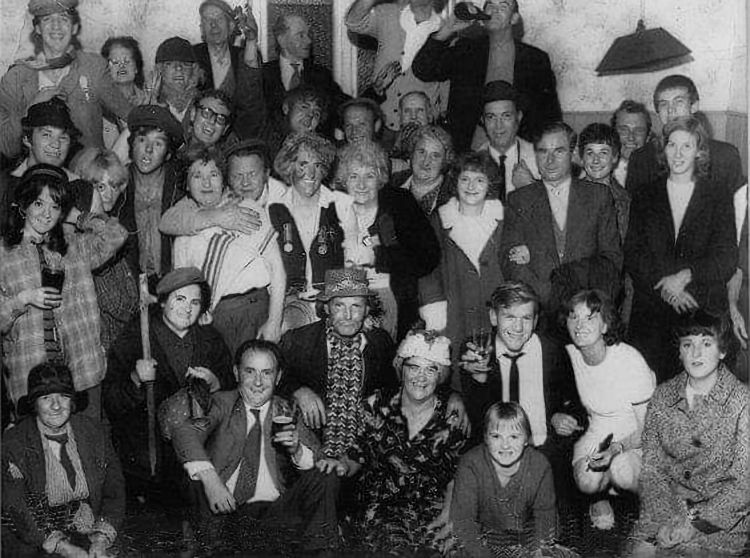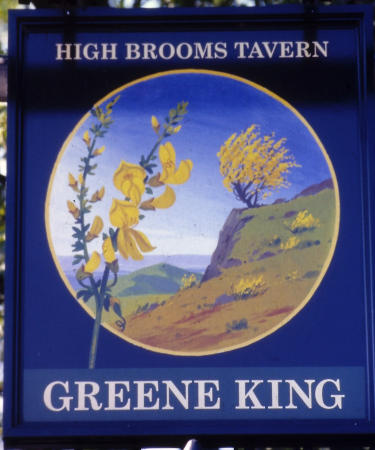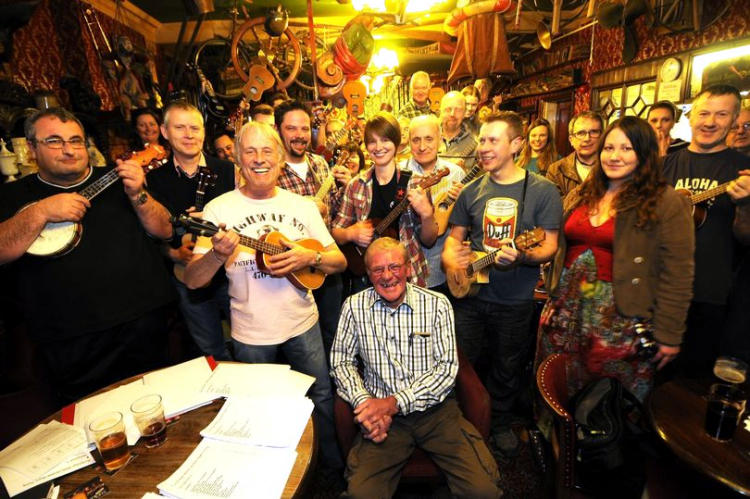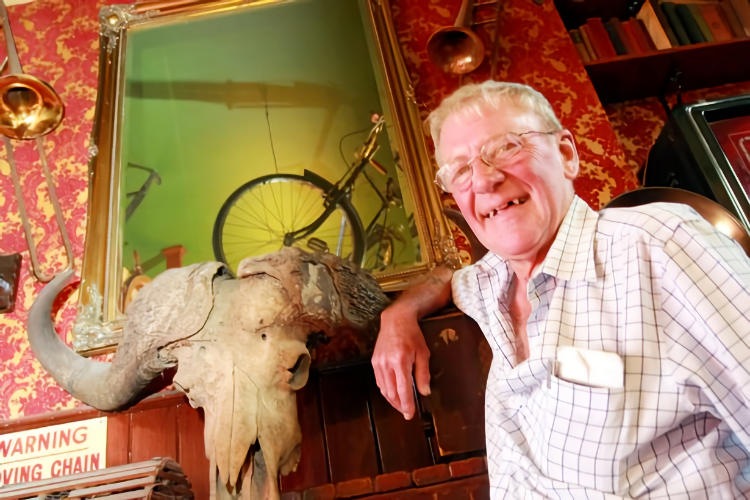|
Written By; Edward James Gilbert-Thunder Bay, Ontario,
Canada Date: 17 May, 2013
THE HIGH BROOMS HOTEL
Situated on a high plot of land on High Brooms Road, overlooking the
countryside was the High Brooms Hotel, built in 1892 from red bricks
supplied by the High Brooms Brick and Tile Company, which had been
founded in the town of High Brooms by John Smith Weare in 1885. Many of
the patrons of the hotel were employees of the brick and tile company.
This three storey hotel, with mock tudor and exposed brick still exists
today as the High Brooms Tavern and although extended and otherwise
altered, it looks for the most part much as it did when constructed ,it
is now just as popular a spot as it was when it first opened. Shown
above is a view of the hotel as it looked in the early 1900's.
Not only has the hotel been a good place to stay, it has been a
favourite local spot for a meal and something to drink. Like most
pubs/hotels some form of entertainment was held there from time to time.
Records of the Tunbridge Wells Billiards League, for example, shows that
the hotels team produced a number of winners and runners-up throughout
the 1970's and 1980's with such names as Pete Mercer, Chris Jeffrey,
Dick Reader, John Heason in the ‘open singles' category. The hotel was
also the champion in the ‘knockout competitions' of 1982/3 and 1983/4.
There were even “ladies singles' events in which Rose Huntley (wife of
the proprietor J. W. Huntley) was the runner up 1984/5. Mary Heasman was
a winner in 1982/3. In men's pairs Mike Betts and Ted Walters were
runners up in 1981/2. The hotel has been represented by many other
talented players as well.
The website of the High Brooms Historical Society adds “ It wasn't
just the decor, nor the beer, that made this a great pub, it had a pulse
of its own and if you turned up after 8pm on many a night you would be
greeted by a room of local musicians playing a variety of instruments
and performing to each other. The nights ranged from the Diddley
Diddley's, traditional acoustic folk or more modern covers performed
solo by individuals accompanied by guitars, harmonicas, and the
accordion - through the acoustic jam nights and of course the ever
popular ukulele nights. 'Twunt' made the pub their home for several
years, often filling the bar with people clutching their under-sized
instruments and joining in with the energetic group play-alongs and
songs, proper happy shiny people moments. And we mustn't forget to
mention that it was also a home to the Brooms Bricks and Bowlers Morris
dancers, traditional morris with a twist and very unique in their bowler
hats, green and black painted faces and of course with more musicians in
tow…they even performed outside alongside ‘Twunt' ….”
In the 20th century the hotel/tavern became a place of great
amusement for upon its walls and ceilings could be found an eclectic
collection of items, mostly thanks to Roy Gibb, who was the proprietor
in 2012 and who kept everything until the building was sold. Previous
proprietors had each added something to the décor.
A complete list of owners of the establishment is not known to the
researcher but the archival records of Beards Brewery, Lewes notes that
they “bought” the hotel in 1925 and owned it until 1980. Articles about
the closing of the pub in 2012 make reference to “Greeneking brewery
pulling out so they could invest in a budget foot and bar in a
neighbouring ward”.
The website of the High Brooms Historical Society has this to say
about the future of pubs. “ The Great British Pub was once at the centre
of every community but sadly it is an institution that has been in slow
decline over the last few years, with public houses closing down at an
alarming rate right across the UK. I guess this is partly a reflection
on the recession hit punters, the rising costs (and increasing duty) on
beer and the cheaper alternatives for home drinkers available at the big
supermarkets. It may also reflect a change in attitude towards alcohol
and the work/family life balance with many mothers working full time as
well as the fathers these days with longer working days and often both
travelling greater distances to work”.
The hotel/tavern has had many proprietors over the years. Below is
some brief information about each of them. The occupancy dates given are
approximate only and are based on directory and census records.
CHARLES WALLOND (1899-1902)
Charles Wallond was born 1845 at Maidstone, Kent. He was one of seven
children born to Thomas Wallond(1807-1891) and Ann, born 1811. In 1869
he married Jane Waters, and with her had six children. Before coming to
High Brooms he was, based on the 1891 census, the innkeeper of the
Queens Head pub in Wateringbury, Kent. The 1901 census, taken at the
High Brooms Hotel records Charles as the licensed victualler and living
with him was his wife Jane and their children. His son Harry was an
apprentice to a carpenter and his son Frederick a bricklayers
apprentice. On November 2,1902 Charles passed away at the High Brooms
Hotel leaving an estate valued at about £1,545. The executors were his
spinster daughter Clara Agnes Wallond and son Harry, a carpenter.
RICHARD BUTCHER (1905-1910)
Richard Butcher is found in the directories at the High Brooms Hotel
throughout the period of 1905 to 1910. Richard was born 1849 at
Chiddingstone, Kent and was one of eight children born to John
Butcher(1807-1861) and Harriet Butcher(1807-1884). He had been baptised
at Chiddingstone December 2,1849 and continued to live there until at
least 1871. In September 1875 he married Avis Ingram(1842-1900) at
Sevenoakes, Kent and with her had two children, Bertha and Arthur. In
1881 Richard was working as a cricket ball maker. The 1891 census, taken
at #1 Quarry Hill Road, Tonbridge records Richard as the innkeeper of
the Station Bridge Inn. Upon the death of his wife he remarried, this
time to Jane Ayling, born 1875 and with her had a son Albert in 1902.
The 1901 census, taken at the Bridge Hotel #1 Quarry Road, records
Richard as the publican and living with him was his wife Jane and two
servants. By the end of 1910 Richard left the High Brooms Hotel. He is
found in the 1911 census as the publican of the Rising Sun Hotel in
Sunninghill, Berkshire. Living with him was his wife Jane and son
Albert. Richard Butler died March 1925 at Exeter, Devon.
ALBERT VICTOR BRASHER SMITH (1911)
Albert Victor Brasher Smith was born 1869 at Lambeth, London. His
father Walter Brasher Smith was a caretaker at the time of his sons
marriage to Martha Sarah Butler July 31,1889 at Bermondsey St Anne
Southwark. Martha, the daughter of William Butler, a decorator, was born
1867 at Bermondsey. At the time of the marriage Albert was working as a
tobacconist. The 1891 census, taken in London records Albert as a
tobacconist living with his wife Martha and a lodger. The 1901 census,
taken at Paddington, London records Albert as a tobacconist on own
account. Living with him was his wife Martha and his 10 year old son
Walter and one servant. The 1911 census records Albert and his wife at
the High Brooms Hotel where he is the licensed victualler. The census
records that the pub had 13 rooms. He left the hotel by 1913.
WILLIAM WALTER SWATLAND (1913)
William Walter Swatland is listed at the High Brooms Hotel in a 1913
directory as Walter William Swatland. He had been born 1871 at Goodhurst,
Kent and was the son of William Swatland, an agricultural labourer and
Eliza, and was one of several children born to the couple. William wed
Mary Ann Gaskin, born 1874 at Marden, Kent in July 1897 at Maidstone.
The 1901 census, taken at the Brick Makers Arms in Staplehurst records
“Walter” W. Swatland as the beerhouse keeper. Living with him was his
wife “Annie” (Mary Ann) and their two children Arthur and Gertrude. A
review of records shows that his name is often transposed as either
William Walter or Walter William but the names of his wife and children
remain the same. The 1911 census, taken at the Rose & Crown Hotel, in
Riddlesdown Kenley, Surrey records William as the licensed victualler.
Living with him was his wife Mary Ann and their four children. William
and his family moved to High Brooms by 1913 and remained there at the
hotel for a few years but was gone by1918. William was living at
Moreland House on London Road, Tunbridge Wells at the time of his death
at the General Hospital, Tunbridge Wells on June 23,1925. He left an
estate of about £782. His two sons William Arthur Swatland, manager, and
Norman Edwin Swatland, shop assistant, were the executors of his estate.
WILSON BROWN (1918)
Wilson Brown followed William Swatland at the High Brooms Hotel. He
is found there in a 1918 Kelly directory. He left the hotel by 1922.
EDMUND HENRY HOWARD ELDRIDGE(1924-1929)
Edmund Henry Howard Eldridge is found at the hotel in the directories
of 1924 to 1929. Edmund was born 1885 at Brighton, Sussex, one of twelve
children born to John Walter Eldridge and Charlotte Eldridge. He is
found living with his parents and siblings at Hove, Sussex in the 1891
census. In the 1901 census, taken at Brighton, Sussex Edmund is working
as a hosiers assistant and living with his parents and five siblings.
Edmund served in WW I in France, having enlisted, while a resident of 84
Tideswell Road, Eastbourn, Sussex, as a private in the army. He had
enlisted December 9,1915; was mobilized May 1916 and was discharged
November 19,1916 and returned to civilian life. His occupation at the
time of his enlistment was “outfitter”. Probate records give that Edmund
died at the High Brooms Hotel November 13,1929. He left an estate valued
at 154 pounds to his wife Gladys Caroline Eldridge.
MRS ELDRIDGE (1930)
After the death of Edmund his wife took over the High Brooms Hotel
and is listed in a 1930 directory as “Mrs Eldridge, High Brooms Hotel”.
She left the hotel by 1934.
JOHN WILLIAM BURBANKS (1934)
John William Burbanks is found at the hotel in a 1934 directory. John
was born in the 1st qtr of 1892 at Basford, Nottingham and was one of
several children born to William Burbanks, born 1870 Kimberley,
Nottinghamshire and Elizabeth Annie Burbanks, born 1869 at Knebworth. In
the 1901 census, taken at Derby, Derbyshire he was living with his
parents and two siblings. In the 1911 census, taken at the same place,
John was age 19 and working as a grocer's shop assistant. He is found in
the census living with his parents and two siblings. His father was an
engine fitter and the census records he and his wife had been married 20
years and had five children but only three had survived. John served in
WW I and enlisted for service while a resident of 8 Railway Terrace,
Derbyshire on December 11,1915. He served with the Royal Garrison
Artillery from 1915 to 1920 as a sergeant and a captain. After the war
he wed Mary and they raised a family. John was a resident of 117 Queens
Road, Tunbridge Wells when he died October 26,1953 at St Leonards
Hospital in East Grinstead, Sussex. He left an estate valued at about
£7,500 to his wife Mary.
B. E. ANDERSON (1938)
By 1938 B.E. Anderson took over the High Brooms Hotel. It is not
clear how long he remained at the hotel and further information about
him is lacking.
WILLIAM ARTHUR KILPATRICK (1946-1950)
William Arthur Kilpatrick is found in directories of 1946 to 1950 as
the licensed victualler of the hotel. William was born March 8, 1907 at Plumstead, Kent. He is found in the 1911 census at #1 Whitworth
Road, Plumstead, Woolwich, Kent living with his grandparents James and
Phebe Russell. His grandfather worked at the Royal Arsenal in Woolwich.
William married a Miss Bowyer at Bromley, Kent in 1932 and was living up
to that time at Woolwich. He divorced his first wife and
in June 1962 he remarried a Mrs Cottenham in Tunbridge Wells.
William died in Tunbridge Wells in the 3rd qtr of 1991, age 84.
T. E. SMITH (1952-1955)
Directories record that T. E. Smith was at the hotel from at least
1952 to 1955. Due to his name being so common no further information was
obtained for him.
NOEL and NELL GIBB(1968-1975)
Noel and Nell Gibb were at the hotel from 1968 to 1975. The source of
this information comes from an account that appeared on the blog of the
High Brooms Historical Society and is based on an interview with their
son Roy Gibb who later ran the hotel. The account reads as follows “ Mr
Gibb's (Roy Gibb) family links to Tunbridge Wells go back almost half a
century. Born in Wadhurst, he moved to High Brooms Working Men's Club
with his parents Noel and Nell Gibb in 1967.After about a year, they
took over the pub and ran it for eight years. When they left they wanted
me (Roy Gibbb) and my late wife Maureen to succeed them, but I was
having too much fun doing my own thing. Back then he was a machine
driver by day and a member of comedy folk group The Three Bums at night.
Roy Gibb said “We had long hair, orange shirts with big collars and
thick cords”. Further information is given about Roy Gibb later in this
account.
JAMES WILLIAM HUNTLEY (1976)
James William Huntley is found at the hotel in 1976. He had been born
November 10,1911 at Newcastle Upon Tyme, Northumberland. He married a
Miss Octon in the 1st qtr of 1936 at Newcastle Upon Tyme. He died there
February 1998.
ROY GIBB (1985-2012)
Roy Gibb was perhaps the longest serving licensed victualler at the
hotel in its history for he was there from 1985 to 2012. He had turned
down an opportunity to take over the hotel from his parents in 1975 as
he had other interests at the time. The blog of the High Brooms
Historical Society is the source for the following information based in
part upon an interview with Roy Gobb. “Mr Gibb and his wife eventually
took over the pub which, he stressed, “has been about having fun”…”This
has always been a good pub, and in the early days it was packed. People
are staying at home now because they can't afford to come out. Some have
lost their jobs, and a lot tell me they're getting paid less now than
they were 10 years ago. In order to survive, I think pubs need to do
things very differently in future. I'd rather this place stayed open but
if it doesn't, I'll be quite pleased to go down in history as the last
landlord of the High Brooms Hotel”. Shown above is a photograph via John
Neller of The High Brooms Tavern before it was closed.
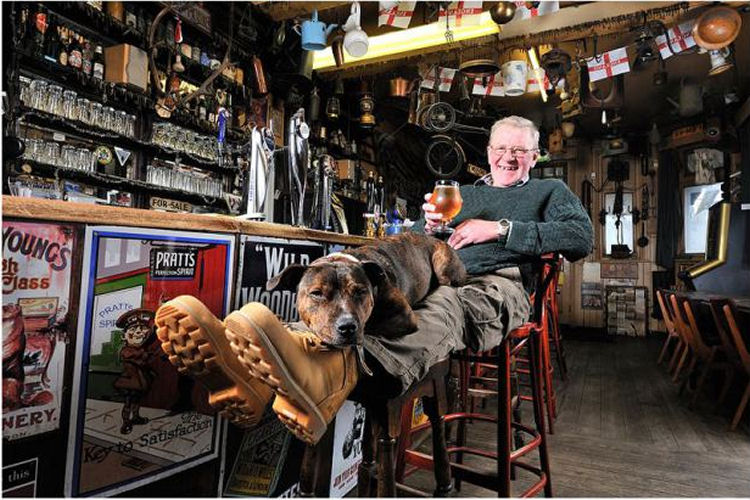
Above photo showing Roy Gibb inside the pub, 2012.
I have referred at the top of the article to the eclectic collection
of items that form part of the décor of the pub. The Kent and Sussex
Courier of February 3,2012 gave the following “ Landlord Roy Gibb is to
auction off the unique memorabilia housed within the High Brooms Hotel.
The pub in High Brooms Road is home to an eclectic range of items
including a Superman figure, a Second World War gas mask, a tank of
silvery fish and a bicycle which dangles from the ceiling. In the saloon
bar next door, a ship's figurehead sails high above the vintage radios.
Fading Victorian signs, the pool table and comfortable chairs are
overlooked by an ageing water buffalo skull. The old fireman's bell
hanging in the bar was used in 1995 to mark the 50th anniversary of V E
Day. For ten minutes, beer was sold at 1945 prices. “It all started with
a few keys.” Recalled Mr Gibb, who is retiring with his daughter and her
family this spring to the country after 27 years”.
An article about the send-off party celebrations outside of the High
Brooms Tavern, held on the occasion of Roy Gibb's retirement Monday July
9, 2012. gives the following. “ One of the biggest send- off parties
I've ever seen. The Tunbridge Wells Ukulele Night Thing filled one bar,
locals filled the other bar, and outside saw The Brooms, Bricks and
Bowlers Morris Dancers, as well as some members of the Orange Circus
Band. Visitors, and neighbours were not short of music, and thanks to an
express delivery, beer either. Roy's artefacts are being got ready for
auction, and the pub is “For Sale”. We can only wait now and see what
happens next…..”. The pub was put on the market with an asking price of
£310,000 but it seems that the price was later reduced. The website of
the High Brooms Historical Society adds “ The previous landlord retired
in 2012…We were left with a shell, an empty Victorian Hotel with boarded
up windows, but full of the happy memories of so many and the sounds of
music and laughter still echoing through the empty bar. The last
landlord was Roy Gibb, who ran the bar as a traditional pub, refusing to
follow the thousands of drinking houses across the UK that ripped out
their heart and soul to become a standardised but sterile pub or trendy
drinking venue, wine bar or gastro pub. This pub was famous for its
décor that had been built up over decades, rather than purchased as a
job lot at an auction in order to create a ‘theme'. The ceilings and
walls were hung with many bizarre oddities, tankards and keys, bikes and
canoes, a life ring, a tortoise shell that had been converted into a
banjo, a moose head, helmets and gas masks and much much more and dusty
shelves were lined with ancient books. It was like stepping back in time
into the 1940's with many larger items reflecting a manual history of
agriculture or relics left over from world war II, often thought it was
like walking onto the set of Nicholas Lyndhurst's ‘Goodnight
Sweetheart'...”
|
